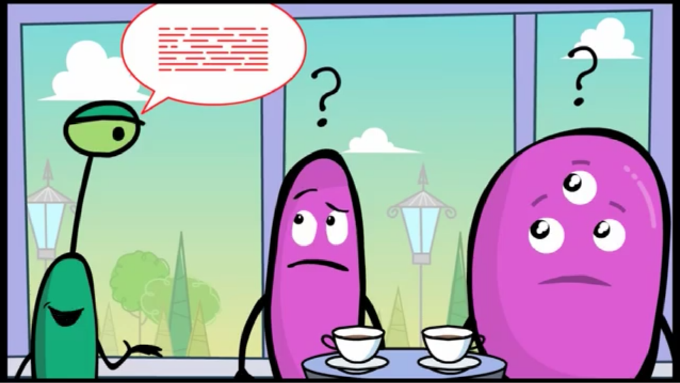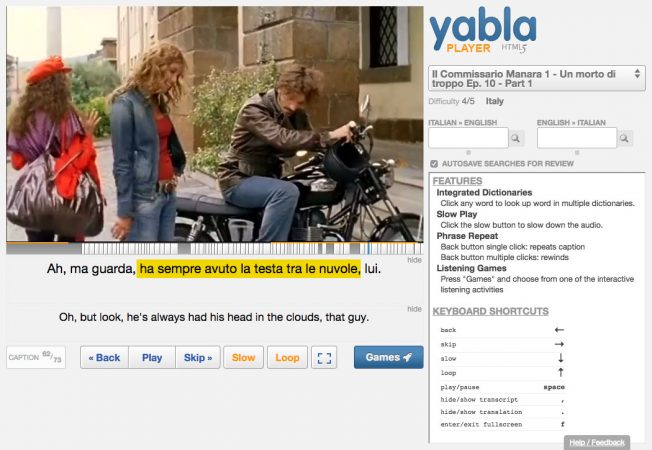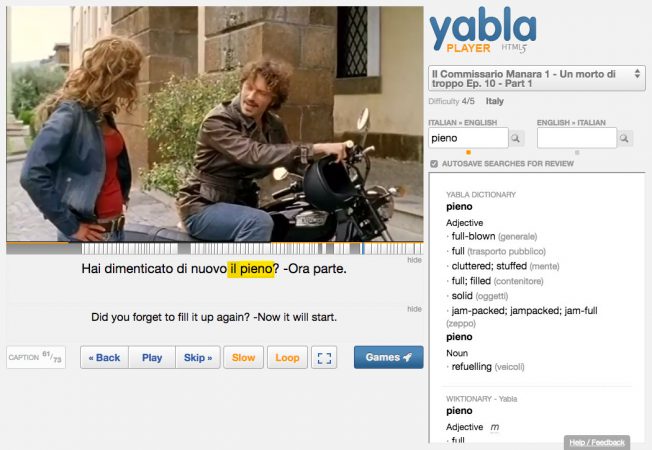Ciao a tutti!
Continuing this week with our series of phrases from Il Commissario Manara: Un morto di troppo on Yabla, we have a phrase that actually came up last week in discussions in our group.
Non vedo l’ora!
I can’t wait!
In our episode, Luca’s sister, Teresa, has just been introduced to Lara, Luca’s love interest throughout the season. She lets it slip that Luca has mentioned Lara to her when she says:
Io non vedevo l’ora di conoscere la donna che è riuscita a mettere il guinzaglio…
I couldn’t wait to meet the woman that managed to put a leash…
Teresa uses the imperfect tense here, but we’ll get to that in a minute. First, what exactly does it mean non vedere l’ora? Translated literally it means:
Non vedo l’ora.
I don’t see the time.
How exactly does that translate to I can’t wait? Well, just like in English, this phrase is purely idiomatic. I have managed to find some interesting ideas among the community at WordReference for why this modo di dire has developed.
I like dragonseven’s idea:
Penso sia una metafora che indica la morbosa impazienza dell’evento scandita del fatto che il tempo della venuta si allunga/allontana percettibilmente sempre più verso l’infinito e di conseguenza non se ne vede più l’arrivo.
I think it’s a metaphor indicating the morbid impatience for the event marked by the fact that the time of its arrival elongates perceptibly towards the infinite and consequently you can’t see its arrival anymore.
Very poetic! But Anaiss really makes the point we need to focus on:
…è un’espressione talmente consolidata che non faccio nemmeno più caso al significato letterale.
It’s an expression so ingrained that I don’t even notice the literal meaning.
And that’s what we have to learn to do, too. It’s just like the many idiomatic phrases we use in English and take so for granted that we don’t even question them anymore.*
It is useful to know what you are saying in a sense because unlike the English version, non vedo l’ora will generally be followed up with di (qualcosa) which won’t make sense if you’re translating as I can’t wait.
Non vedo l’ora di vederti!
I can’t wait to see you!
Or more literally:
I don’t see the time of seeing you!
So, now it makes more sense when we see Teresa’s remark in the imperfect tense.
Non vedevo l’ora di conoscere la donna…
I wasn’t seeing the time of knowing the woman…
Here are some examples of this phrase in action from Reverso:
La gente non vede l’ora di spettegolare sulle disgrazie.
People can’t wait to gossip about misfortunes.
E non vede l’ora di incontrarti.
And s/he can’t wait to meet you.
Scommetto che non vedi l’ora che muoia per tenerti tutto!
I bet you can’t wait for me to die so you can get everything!
E non vedono l’ora di sguazzare nel fango.
And they can’t wait to play in the mud.
Non è giusto, non vedevo l’ora di stare con te.
That’s not true, I couldn’t wait to be with you.
Ieri sera non vedevi l’ora di lasciare tutto questo.
Yesterday evening you couldn’t wait to leave all this.
But what if you want to say you can’t wait until something? In that case, you need to use che, and this gets a little bit more complicated because it requires the subjunctive or the Italian congiuntivo. This really isn’t as hard as it sounds. Say enough phrases out loud often enough and you will come to expect the sound of the congiuntivo. You will find yourself getting it right without knowing how you managed it.
Non vedo l’ora che sia venerdì.
I can’t wait until (it is) Friday.
Ma non vedo l’ora che arrivi quel giorno.
I can’t wait until that day arrives.
But if you’re just beginning your study of Italian, don’t sweat it. For now, just say:
Non vedo l’ora!
E io non vedo l’ora che arrivi la prossima lezione!

Wait… what language is THAT?
Yabla Italian is an excellent tool to help you develop an ear for spoken Italian. (I use Yabla personally to study three different languages.) With Yabla Italian you will have:
- verbatim subtitles in Italian
- access to English subtitles when you need them
- the ability to turn the subtitles off as you improve
- quizzes to gauge how well you’re doing
And… this is especially useful… you can slow the video down! Yes! We all know how fast the Italians talk. You know a lot of the words. If you just had a little more time to process them…. Well, now you do!
If you feel your Italian is good enough to watch without Italian (or English) subtitles, this episode of Il Commissario Manara is also available for free from RAI. You will need to fast forward to exactly 48 minutes for the start of Un morto di troppo.
*Need some examples? Here you go: When you pull your car into the driveway, what exactly are you pulling? (maybe once it was a team of horses?) Take a nap? Take an exam? Where are you taking it? Pay attention? Who do you pay? (In Italian you lend it!) Very soon to dial the telephone will sound very strange to people. If you start to notice it, English is just full of examples like this. And we don’t even notice them!






